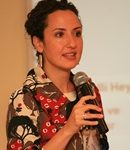This question captures the ethos of the late visionary Olga Alexeeva who saw emerging markets as an opportunity to cultivate new donors. Starting in her native country of Russia, she had just begun to expand this work in Brazil, India and China through the newly established Philanthropy Bridge Foundation (PBF), based in the UK. She and her team were running a menu of programmes in these countries while also exploring expansion into Turkey and many others. Yet, as fate would have it, those of us that Olga inspired and mobilized would be left to continue this journey without her.
But now that Olga is gone, how and with whom would we continue this journey? That was the guiding question for the ‘search’ conference organized by the soon-to-be former trustees of the Philanthropy Bridge Foundation in late January. This convening brought together 41 participants from 14 countries (among them representatives from emerging markets such as Brazil, China, India, Egypt, South Africa and Turkey) who spent just about two full days reviewing the work of PBF and developed initial action plans to pursue the following activities, which can be roughly grouped as follows:
- Seminars and events to bring together new/potential donors to share techniques and information on how to manage their philanthropic contributions.
- Formal training programmes for existing donors (eg family foundations) to enable more strategic and effective philanthropy, as well as programmes for NGOs to build fundraising and donor development skills.
- Meetings to explore specific issues such as China’s increasing private investment in South Africa.
- Gathering data and disseminating reports about which organizations/actors are presently active in this field and trends in philanthropy.
There was also an expressed desire to maintain a loose network of organizations and individuals pursuing these activities to engage and support new donors, which could convene on a regular basis to discuss trends and share experiences.
New opportunities bring new challenges
While this particular field of engaging and supporting new donors in emerging market countries tends to focus on the opportunities, there are also some challenges that lie ahead. While this subject was not the focus of the PBF meeting, there is merit in exploring the implications of growth in these countries and the (new and also emerging?) roles of civil society and philanthropy. For example, as Turkey maintains 9 per cent economic growth and enjoys increasing geopolitical involvement, civil society will need to play an important role in holding the market and government accountable to promoting growth with equity domestically as well as keeping an eye on, and perhaps a more active hand in, the steadily increasing overseas development and bilateral aid programs (for example, Turkey’s aid has increased nearly 300 per cent over the past eight years, it is now the lead donor in South Sudan with Norway, and is also leading support for the Least Developed Countries initiative of the UN).
These are likely to be trends common to many emerging markets, and as such there may be value in convening foundations to share valuable insights and know-how, as well as to discuss challenges including institutional development, strategies for addressing rights and development issues, building the capacity of the NGOs they work with, and working with government – just to name a few.
While we commit to continuing Olga’s legacy, which sheds light on the opportunities of promoting philanthropy in emerging-market countries, we should also explore the challenges and work to ensure a strong third sector that will hold these markets and respective governments accountable for growth with equity.
Filiz Bikmen is director of programs and international relations at the Sabanci Foundation and a member of the Governing Council of the European Foundation Centre.






Comments (0)